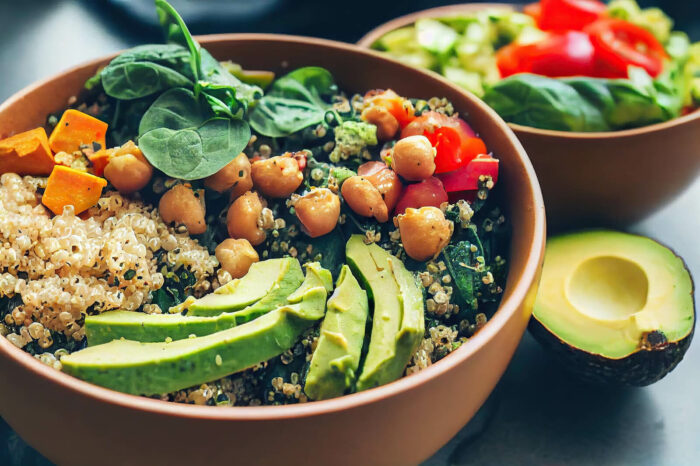Can Vegan Protein Powder Upset Your Stomach?

Vegan protein powder is a amazing way to acquire the protein your body requires. The question asked is can vegan protein powder upset your stomach? While it can give effective vegan nourishment, you should be aware of the potential digestive issues that this type of supplement may create. It is vital to know that certain powders contain more fiber than usual, which can irritate your stomach even more.
Can Vegan Protein Powder Cause Stomach Pain?
Stomach aches and pains might be a negative effect of using vegan protein powders for the first time. Many people experience stomach pain when they modify their diet and begin consuming more plant-based proteins. As soon as you swap out your regular protein shake for vegan protein powder, plant-based protein powder may give you an upset stomach. Whether you take animal-based or plant-based protein powder, let’s ask ourselves, “why take protein powder in the first place?”
The Importance of Protein
People who workout know the importance of protein in their diet. Protein, an important building block of our body, can help us stay healthy and energized. Protein is essential for our stomach since it aids in the healing of any damaged muscle and boosts the body’s immunity. We can become fatigued, have mood changes, and harm our overall health if we do not consume enough protein.
To get the best benefits from a higher protein diet, we should include several types of proteins in our daily routine, such as whey protein powder, collagen protein powder, egg protein powder, and plant vegan proteins like pea or soy proteins. Whey is derived from cow’s milk and is one of the most widely available sources. Plant-based proteins, such as pea, hemp, or soy, contain all of the essential amino acids and are a wonderful vegan alternative. Protein helps to strengthen your muscles and maintain your energy levels, so make sure you consume enough every day. Therefore, you should review your protein consumption daily because it is critical for general health.
Why Does Plant-based Protein Powder Hurt My Stomach?
Plant-based protein powder is an excellent supplement to incorporate in your workout routine. However, it is not uncommon for those who experiment with plant-based protein powder to experience stomach problems or other symptoms. When consuming vitamins and workout shakes, the stomach, as the main organ responsible for digesting, is put to work. When taking a plant-based powder, stomach aches can arise. These stomach-aches could be caused by a variety of causes, including spices, preservatives, and even gluten-containing cereals. Furthermore, many supplements have not been evaluated on people who have sensitive stomachs or other digestive disorders. That is why, while trying out a new product, it is critical to pay attention to the ingredients in order to understand what you are digesting.
Gluten, which can be difficult for some people’s stomach to handle and can cause painful and unpleasant sensations, can be found in plant-based protein powders. Furthermore, the gut microbiome needs time to adjust when changing your diet; hence, stomach pains may occur if your gut bacteria are still attempting to adapt to the nutritional changes that come with utilizing a plant-based protein supplement.
Therefore, if you find that plant-based protein powder is causing intense stomach pains or discomfort it is best to consult with your doctor for alternative options. You can also try to see if any stomach pain treatments may help. This is why it is important to consume only the proper amount of proteins.

How Much Protein to Eat
Protein consumption is critical for maintaining a healthy lifestyle. Hence, it’s critical to learn stomach-related facts when it comes to putting enough protein into your diet. Eating too much protein can have a bad impact on your digestive system, causing constipation and bloating.
The amount of protein you should consume may range from what is recommended depending on your stomach and digestive system. It is recommended to consume 0.36 grams of protein per pound of body weight or 0.36 grams of protein per kilogram of body weight. You can also utilize dietary supplements to meet this recommendation if necessary. To avoid vitamin and mineral imbalances, be aware of the source and quality of your supplements. Always remember that the correct amount of high-quality protein will provide you with long-term health benefits.
Is Vegan Protein Hard to Digest?
Is vegan protein more difficult to digest than non-vegan protein? That answer, however, is not as simple as it appears. In general, vegan diets contain more fiber, which can hinder digestion and cause stomach troubles such as cramps or constipation if ingested in excess. However, when it comes to measuring digestibility, the type of vegan protein supplement is important. Processed foods with questionable ingredients and food additives might be more difficult for the stomach to take than healthier, plant-based ones. Even stomach sensitivity influences how well we digest food, whether it’s animal or plant-based proteins.
If stomach issues are a concern, a vegan protein shake may be the best option because they are pre-digested and thus easier for your stomach to digest. Focusing on vegan foods that are not too processed and low in fillers is vital for long-term health. That doesn’t mean you should completely shun supplements or processed ingredients; simply be aware of the ingredients and request clarification before purchasing. Vegan protein sources like quinoa, lentils, and peas give essential minerals for long-term energy, immune boosting characteristics, and satisfaction without compromising digestive health.
Finally, while looking for a trustworthy source of vegan protein, do your research – look for supplements created with natural ingredients that are comfortable on the stomach. With enough research and careful product selection, you’ll be able to find solutions that meet both your nutritional demands and your health objectives. But what is the limit?
How Much Protein Is Too Much?
Protein consumption can have a significant impact on our overall health and wellness. The stomach can only process so much protein and overloading it with it might result in some unpleasant side effects. Not to mention that different protein sources have vastly diverse quality and nutritional properties, so selecting the right ones is critical! Whether it’s animal-based proteins like beef and eggs, plant-based proteins like quinoa and soy, or more processed ingredients like supplements and bars, there are steps you can take to ensure that your stomach isn’t overloaded with too much protein intake. All of this to say that determining how much protein intake is too much isn’t always straightforward – so seeking out a nutritionist or doctor who has experience with personalized diet plans may be able to help provide answers that are more tailored to your individual needs when it comes to finding the right amount of protein for your body. This way, you can avoid any undesired side effects or negative health consequences from eating too much protein. Unfortunately, you have to keep in mind that another negative consequence to our health is getting an allergic reaction to vegan proteins.
Allergic Reaction to Vegan Protein
If you’ve recently moved to a vegan diet and are concerned about having an allergic reaction to vegan proteins, the most typical symptom is stomach discomfort. Although vegan protein sources are becoming increasingly popular, it is crucial to note that they might cause allergic responses. For example, stomach irritation and other symptoms can be a result of a soy allergy – one of the most common plant proteins found in vegan dietary supplements. Mild stomach discomfort to severe anaphylaxis are possible reactions. To enjoy these premium plant vegan proteins safely, make sure you buy from brands and sources who conduct allergen testing on their goods, and consult your doctor if you have any pain after taking a vegan supplement. Another tip is to plan the amount and frequency of protein intake.
Protein Timing
Protein timing is something to think about if you’re serious about getting the most out of your protein consumption. Protein timing is a key opportunity to use protein powder to gain strength and muscle mass. Timing protein consumption correctly can have a positive effect on muscle protein synthesis and help ensure that protein is split evenly throughout the day to meet various dietary needs. Even the type of protein powder also needs to be considered along with protein timing.
There are many protein powders available on the market today: protein concentrate powder, protein isolate powder, egg protein powder and collagen protein powder. Each form of powder has advantages and disadvantages that make it better or worse for different people based on their aims. Protein concentrate, for example, is heavy in calories and carbohydrates, but protein isolate is substantially lower in both nutritional and lactose content. Protein collagen is not good for everyone since it lacks lysine, an essential amino acid for muscle protein synthesis. As a result, protein timing is critical when taking protein powder; make sure you’re utilizing the proper type of protein powder for your needs to fully reap the advantages or else you’d be facing digestive problems.
Digestive Problems
Digestive problems can range from sharp, unbearable cramps to persisting diarrhea. People with poor digestive health frequently experience gas, bloating, and nausea. If you are one of them, stevia as a substitute sweetener may provide relief – but make sure it is unflavored and free of carbs, tastes, and other metals present in sources such as sugar and artificial sweeteners. Drink these regularly for at least two weeks can help in reducing digestive issues and ridding the body of harmful bacteria. You may get some relief from your stomach and digestive problems if you keep these recommendations in mind. However, seek expert help as well to best guarantee that your difficulties do not worsen over time.
Artificial Sweeteners
On the note of artificial sweeteners, keep in mind that these have been a welcome addition to food and drinks. They provide a guilt-free approach to increase sweetness without adding calories, allowing consumers to better satisfy their sweet desire without straining their stomach. Protein powders are excellent options for people who want to acquire their daily protein requirement without consuming big amounts of stomach-dissatisfying food. These powders, which are now available in a range of delectable flavors such as chocolate, vanilla, and milk, can be utilized in a protein powder drink, shake or smoothie. To top it all off, these simple solutions are frequently laced with artificial sweeteners, allowing us to indulge without feeling guilty about it. Regardless of the brand you choose or if your taste leans towards unflavored or flavored protein powder, rest assured you will be getting a good, if not great, quality flavor with artificial sweeteners.
Should You Switch Brands?
If you’re wondering whether or not to switch brands, the answer is yes – but proceed with caution. Consider why your stomach isn’t responding as effectively to the products you’re currently using. If you need additional fiber or protein, try soy milk with added fiber or protein powder collagen for increased nourishment. Perhaps the product is too sugary or salty for your stomach to accept; if so, a brand swap may be just what your stomach requires. Consider trying something new and reading labels carefully to verify that the product you purchase contains stomach-friendly elements and see if making a switch might be an optimal decision for you!





